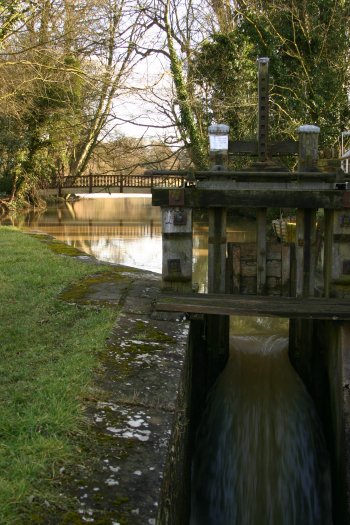Good morning on what looks like it could be a moderately promising day. We’ve had a couple of positively grand days during the week – perhaps not quite as warm as one might like but the clear, blue skies and bright sunshine almost make up for the fact that the temperature is still only slightly on the right side of buggeringly cold. Still, a few photos will brighten things up.

Molly & Ms Playchute on the Edgecote walk |

Old stone bridge over the Cherwell at Edgecote |
|

Fence at Edgecote |

Old stone wall at Edgecote |
|

Sluice gate on the mill pond at Edgecote House |

Old door to the vegetable garden at Edgecote House |
|

Snowdrops at Edgecote House |

Snowdrops and Celandine at Chipping Warden |
|
Ms Playchute and I made our annual expedition to the Byfield Quiz Night yesterday evening and emerged relatively unscathed from the adventure. For some reason, a couple in the village (the woman from whom we borrowed the apartment in Prague a few years ago) seem to have come to the woefully mistaken conclusion that we are some sort of asset on a Quiz team and, in spite of our protestations that nothing could be further from the truth, as well as our pathetic performances year after year, they always give us a call in the middle of February to secure our services at the annual quiz night in early March. Naturally, it’s as much as either Ms Playchute or myself can do to remember our names for the entry form but yesterday evening we were on top form, finishing fourth overall. (And, before you speculate that there were four teams in the evening’s competition, let me assure you that there were considerably more than four. Well, there were sixteen so still not too bad).
And, even better, for the first time in as long as I can remember, we actually won one of the raffle prizes. I am now the proud owner of a set of “Lamborghini” eau de toilette and body spray which looks as if it has been passed around every raffle competition since the early 1970s. I can see a donation to another local charitable event in my future. Hmm, I wonder if whomever originally donated this all those years ago is still around to have a chance to win it back again?
Not sure what quality and quantity of coverage you’ve had of the Chilcott enquiry, if any. This is the enquiry into the decision to go to war in Iraq and an investigation into the way in which the war has been conducted. We’ve now had all the “big players” and it is very interesting to note the ways in which they were all 100% correct about the decisions taken, that no mistakes have been made and that they would do the same thing again.
Alistair Campbell testified some weeks ago. He was Tony Blair’s principal adviser during the period and he is widely credited with authoring the “dodgy dossier” which claimed that Iraq could launch its weapons of mass destruction threatening the UK in forty-five minutes. Much of the analysis in the dossier was plagiarised from a PhD student off the internet, it seems and all three statements have since been widely discredited. Yet he is still adamant that the dossier was accurate. What planet do these people live on? If you say something sufficiently often with sufficient purpose does it somehow become true?
Then we had the blessed St Tony himself who similarly had no regrets, made no mistakes and would do exactly the same thing again. He did get himself into a bit of a muddle having forgotten that the war, originally, was intended to get rid of all those pesky weapons of mass destruction. He was, it seems, OK with the concept of regime change right from the outset, even though that would clearly have been illegal under international law.
And on Friday we had Gordon Brown’s initial testimony. Again, you will no doubt be surprised to learn that no mistakes were made, that he would support the war again and that the service personnel have had all the resources and equipment that money can buy (which will come as a surprise to the military personnel who have been clamouring for more equipment, particularly helicopters, almost from day one). At least Gordon did have the sensitivity to express “regret” at all the lives which have been lost, something that Tony did not do even when handed the opportunity on a platter by the enquiry. I suppose, above all, it really is true that politicians learn nothing from either their own mistakes or the evidence of history.
I ran across the following on the Time web site a few days ago although it's also been on the BBC web site and several others. Apologies for the length.
Study: Are Liberals Smarter Than Conservatives?
By John Cloud Friday, Feb. 26, 2010
The notion that liberals are smarter than conservatives is familiar to anyone who has spent time on a college campus. The College Democrats are said to be ugly, smug and intellectual; the College Republicans, pretty, belligerent and dumb. There's enough truth in both stereotypes that the vast majority of college students opt not to join either club.
But are liberals actually smarter? A libertarian (and, as such, nonpartisan) researcher, Satoshi Kanazawa of the London School of Economics and Political Science, has just written a paper that is set to be published in March by the journal Social Psychology Quarterly. The paper investigates not only whether conservatives are dumber than liberals but also why that might be so.
The short answer: Kanazawa's paper shows that more-intelligent people are more likely to say they are liberal. They are also less likely to say they go to religious services. These aren't entirely new findings; last year, for example, a British team found that kids with higher intelligence scores were more likely to grow into adults who vote for Liberal Democrats, even after the researchers controlled for socioeconomics. What's new in Kanazawa's paper is a provocative theory about why intelligence might correlate with liberalism. He argues that smarter people are more willing to espouse "evolutionarily novel" values — that is, values that did not exist in our ancestral environment, including weird ideas about, say, helping genetically unrelated strangers (liberalism, as Kanazawa defines it), which never would have occurred to us back when we had to hunt to feed our own clan and our only real technology was fire.
Kanazawa offers this view of how such novel values sprang up in our ancestors: Imagine you are a caveman (if it helps, you are wearing a loincloth and have never shaved). Lightning strikes a tree near your cave, and fire threatens. What do you do? Natural selection would have favored the smart specimen who could quickly conceive answers to such a problem (or other rare catastrophes like sudden drought or flood), even if — or maybe especially if — those answers were unusual ones that few others in your tribe could generate. So, the theory goes, genes for intelligence got wrapped up with genes for unnatural thinking.
It's an elegant theory, but based on Kanazawa's own evidence, I'm not sure he's right. In his paper, Kanazawa begins by noting, accurately, that psychologists don't have a good understanding of why people embrace the values they do. Many kids share their parents' values, but at the same time many adolescents define themselves in opposition to what their parents believe. We know that most people firm up their values when they are in their 20s, but some people experience conversions to new religions, new political parties, new artistic tastes and even new cuisines after middle age. As Kanazawa notes, this multiplicity of views — a multiplicity you find within both cultures and individuals — is one reason economists have largely abandoned the study of values with a single Latin phrase, De gustibus non est disputandum: there's no accounting for taste.
Kanazawa doesn't disagree, but he believes scientists can account for whether people like new tastes or old, radical tastes or Establishment ones. He points out that there's a strong correlation between liberalism and openness to new kinds of experiences. But openness to new experience isn't necessarily intelligent (cocaine is fun; accidental cocaine overdose is not).
So are liberals smarter? Kanazawa quotes from two surveys that support the hypothesis that liberals are more intelligent. One is the National Longitudinal Study of Adolescent Health, which is often called Add Health. The other is the General Social Survey (GSS). The Add Health study shows that the mean IQ of adolescents who identify themselves as "very liberal" is 106, compared with a mean IQ of 95 for those calling themselves "very conservative." The Add Health study is huge — more than 20,000 kids — and this difference is highly statistically significant.
But self-identification is often misleading; do kids really know what it means to be liberal? The GSS data are instructive here: Kanazawa found that more-intelligent GSS respondents (as measured by a quick but highly reliable synonym test) were less likely to agree that the government has a responsibility to reduce income and wealth differences. In other words, intelligent people might like to portray themselves as liberal. But in the end, they know that it's good to be the king.
The jury may be out on whether conservatives are less intelligent than liberals, but there's evidence that they may be physically stronger. Last year, the Proceedings of the National Academy of Sciences published a fascinating paper by Aaron Sell, John Tooby and Leda Cosmides of the Center for Evolutionary Psychology at the University of California at Santa Barbara. The authors measured the strength of 343 students using weight-lifting machines at a gym. The participating students completed questionnaires designed to measure, among other things, their proneness to anger, their history of fighting and their fondness for aggression as a way to solve both individual and geopolitical problems.
Sell, Tooby and Cosmides found that men (but not women) with the most physical strength were the most likely to feel entitled to good treatment, anger easily, view themselves as successful in winning conflicts and believe in physical force as a tool for resolving interpersonal and international conflicts. Women who thought of themselves as pretty showed the same pattern of greater aggression. All of which means that if you are a liberal who believes you're smarter than conservatives, you probably shouldn't bring that up around them. You might not like them when they're angry. |
I guess I must be very, very smart!
Love to you all,
Greg
An Interesting Observation About People and Sports
1. The sport of choice for the urban poor is basketball.
2. The sport of choice for maintenance level employees is bowling.
3. The sport of choice for front-line workers is football.
4. The sport of choice for supervisors is baseball.
5. The sport of choice for middle management is tennis.
and....
6. The sport of choice for corporate executives and officers is golf.
Of all these facts we are sure.
The Inescapable and Astounding Conclusion:
The higher you go in the corporate structure, the smaller your balls become.
Interesting Year 1981
1. Prince Charles got married
2. Liverpool crowned soccer Champions of Europe
3. Australia lost the Ashes (cricket) tournament.
4. The pope died
Interesting Year 2005
1. Prince Charles got married
2. Liverpool crowned soccer Champions of Europe
3. Australia lost the Ashes tournament
4. The pope died
Lesson to be learned:
The next time Charles gets married, someone warn the Pope
Adam forwarded this along although how he would know I can’t imagine:
A group of 50-year-old buddies meet in their college town for a reunion, and discuss and discuss where they should meet for dinner. Finally it is agreed that they should meet at Chez Snooty because the waitresses there have low-cut blouses and nice breasts.
Ten years later, at 60 years of age, the group meets again, and once again they discuss and discuss where they should meet. Finally it is agreed that they should meet at Chez Snooty because the food there is very good and the wine selection is the best in town.
Ten years later at 70 years of age, the group meets again and once again they discuss and discuss where they should meet. Finally it is agreed that they should meet at Chez Snooty because they can eat there in peace and quiet, and the restaurant is smoke free.
Ten years later, at 80 years of age, the group meets again and once again they discuss and discuss where they should meet. Finally it is agreed that they should meet at the Chez Snooty because the restaurant is wheelchair accessible, and they even have an elevator.
Ten years later, at 90 years of age, the group meets for one last reunion, and once again they discuss and discuss where they should meet. Finally it is agreed that they should meet at Chez Snooty, because none of them have ever been there before.
Back to the Befouled Weakly News







